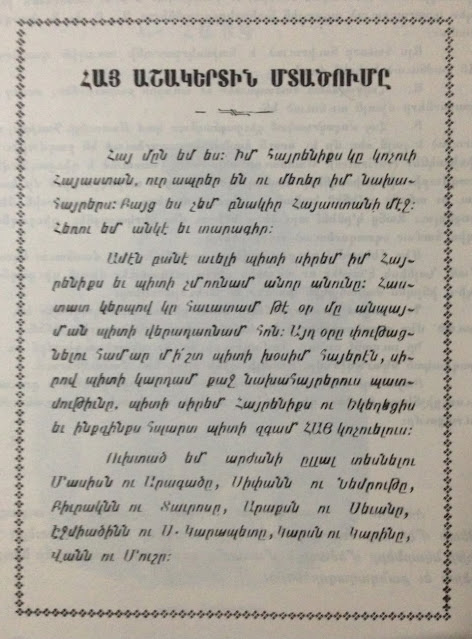Բնագիրը կցուած է։ Attached is my Google aided translation of the French Armenian political scientist Gaydz Minasian’s interview that the Armenian socio-political platform “Mer Oughin” had posted today, January 11, 2025. The link to the orginal in Armenian is posted below. Vahe H Apelian.
 |
| Courtesy "Mer Oughin" |
According to the political scientist, Aliyev's primary desire is for US President Donald Trump to give importance to Azerbaijan as a strong state in the region and to establish strong ties with it. Currently, Azerbaijan’s relation with Russia and Iran is complicated, not simple. Its relations with Turkey are good, but not one-sided. And of course, its relations with Armenia is in a half-war, half-peace. Azerbaijan will always be aggressive towards Armenia in one way or another, but it wants to show Trump that it has problems with Iran, France, and also Russia, and that Azerbaijan is a strong country and that the US should consider it first and foremost in the South Caucasus, and not Armenia.
As for Yerevan, Gaydz Minasian noted although Armenia is “more sovereign” today than in the previous thirty years, but that is not enough, since there is no level of internal politics within the country that would make the country fully sovereign. If Armenia cannot strengthen and establish itself internally, it will always suffer some kind of slap from someone, in this case from Azerbaijan. What is happening in Armenia? There are almost no internal state institutions. More or less work is being done with the army and the Constitutional Court, but they are not enough. In other respects, everything is at a standstill. The Velvet Revolution remained halfway. Yes, some things were done, but they are not enough at all. Armenia must now understand that the main task facing it is to establish internal stability. It is very simple, why does the so-called political elite of Armenia not understand this? From Levon Ter-Petrosyan to Serzh Sargsyan, plus the ARF Dashnaktsutyun and various charitable associations, amount to absolutely zero. The Armenian opposition is busy serving the interests of a foreign country, Russia. We have no state institutions and no political elite in the country.
The political scientist insisted that focusing only on foreign policy is not right. What do we have to do with Greenland or Panama? Every month a new event takes place in the world. So we should leave our internal issues and deal with analyzing events that have nothing to do with us. What does this give Armenia? Armenia, like many post-Soviet countries, is currently subject to Russian influence. Yes, the Armenian authorities have taken a political course towards the West. But don’t they understand that going to the West is impossible if you don’t change your way of doing things, your style, your mindset? Armenia, with its current mindset, is still the same as Soviet or post-Soviet Armenia. Armenia today must work 24 hours a day, seven days a week, if it wants to make real and serious changes, to establish itself as a country, otherwise it is impossible, while we continue with the same way of doing things that we had 30 or more years ago.
Turning to Europe, the political scientist noted that at the moment Europe itself has its own economic and security problems and Macron's speech was precisely about the fact that Europe should not and cannot entrust its entire defense mechanism to the US, Europe must ensure its own security. Seeing all this, we must understand that Europe and Russia have the following attitude towards Armenial Russia wants Armenia (as well as other post-Soviet countries) not to become truly independent and stable, but to have a tsarist government there that will serve Russia's interests. Europe wants to see not a puppet government, but a stable state.
Armenia should simply understand that it has one overarching task and that task is to become an internally developed state. The necessary priorities for this change to come about are the army, the economy and education, nothing else, the political scientist concluded.
Gaïdz Minassian is a French journalist and political science PhD who works for the daily newspaper Le Monde. He also teaches at Sciences Po Paris. Minasian has written about the Armenian Genocide and how it became a tool of Western diplomacy. He has also considered how Armenia might take advantage of the shift in global geopolitics that has led to the recognition of the Armenian Genocide by the U.S
The link to the original: https://mer-oughin.am/2025/01/11/%d5%b0%d5%b0-%d5%a3%d5%a5%d6%80%d5%ad%d5%b6%d5%a4%d5%ab%d6%80%d5%a8-%d5%b6%d5%a5%d6%80%d6%84%d5%ab%d5%b6-%d5%af%d5%a1%d5%b5%d5%b8%d6%82%d5%b6%d5%b8%d6%82%d5%a9%d5%b5%d5%b8%d6%82%d5%b6%d5%b6-%d5%a7/








